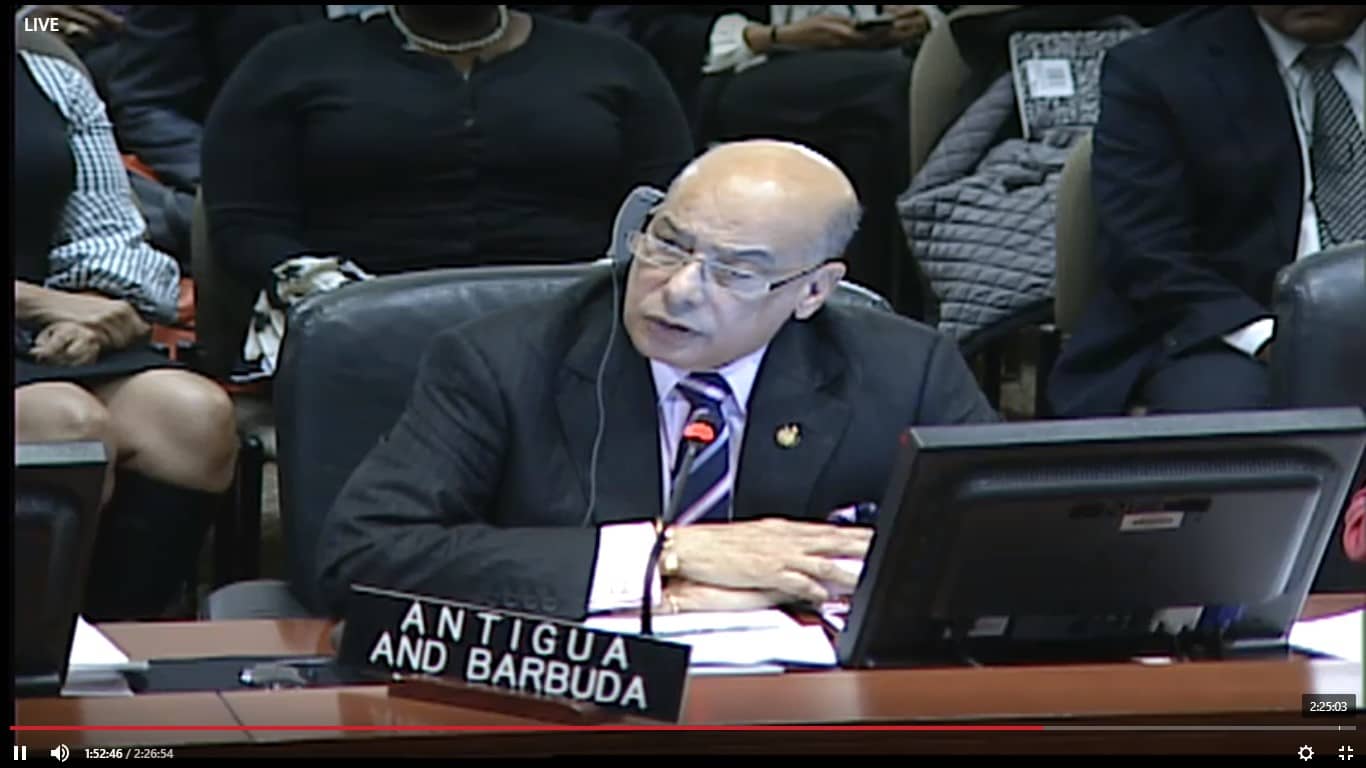
By Sir Ronald Sanders
(The writer is Ambassador of Antigua and Barbuda to the United States and the Organisation of American States. He is also a Senior Fellow at the Institute of Commonwealth Studies at the University of London and at Massey College in the University of Toronto. The views expressed are entirely his own)
Despite a lofty statement on March 26, the world’s richest nations, the G20, have responded poorly to the devastating effects that COVID-19 is having on the global economy, particularly small and vulnerable states.
The G20 pledged to “work swiftly and decisively with the front-line international organizations, notably the World Health Organization, the International Monetary Fund, the World Bank Group, and multilateral and regional development banks to deploy a robust, coherent, coordinated, and rapid financial package and to address any gaps in their toolkit”.
Yet, there is a marked absence of international consultation and global solidarity. Instead, wealthy nations have retreated into nationalism, protectionism and isolationism.
In the absence of a coherent international response, small and vulnerable states, especially those that are highly reliant on tourism, will be the worst victims. For at least two years after COVID-19 is brought under control, the economies of these countries, will languish in economic lassitude and regression, causing social discontent, disquiet and, maybe, even disorder.
The United States (US), which should be the leader of global action, has been prominent in its inaction. Preoccupied with Presidential elections in November and the rising number of deaths and the declining performance of the economy, the US government and the Congress are both focussed on “America first”.
No one can blame them for attention to their country’s needs, but the adverse effects of COVID-19 cannot be surmounted by “America only”. The US relies on the rest of the world to be a vibrant market for its goods and services. When the economies of these countries contract and their earnings decline, their capacity to buy from the US shrinks and so do their imports of US goods and services that maintain US employment and revenues.

Apart from a statement on April 7 that the US had mobilised “US$6 million to provide test kits to Barbados and more than 60 other countries to fight the spread of COVID-19” – about US$10,000 per county – there has been no announcement by the US government of any initiative to provide funds that would help developing countries, especially those in its immediate neighbourhood, to cope with the grave blows to their economies.
It must be hoped that this is a delay and not a decision, and that US leadership that has, in the past, contributed to global recovery will emerge once again.
Similarly, while on April 8 the European Union (EU) announced that €918 million will be allocated “to support our partners in Latin America and the Caribbean”, no details have been given of who will be the beneficiaries and on what basis. On April 3, the EU announced a grant of US$8.6 million to help the Caribbean fight the coronavirus outbreak. Roughly that sum works out to US$57,000 each for 15 countries, while these countries have had to spend tens of millions. The EU failed to mobilise a plan for its own membership. Instead, member countries of the Community unilaterally imposed restrictions on each other, stopping transport links without coordination. Every country withdrew into its own cocoon.
Notwithstanding its medical supplies to some countries, China, too, has announced no proposals for a Fund of its own to help vulnerable developing countries to cope with the economic battering they are enduring.
China’s response has not matched its economic and financial capacity. But it has the opportunity now to provide global leadership. There has never been any better or important time for China to give meaning to its often-stated commitment to South-South co-operation. It has a real chance to bolster its standing as well as to protect its loan investments in many of the affected countries.
These countries, particularly the tourism dependent ones, have lost as much as 20% of their Gross Domestic Product in the first quarter of 2020, and the next two quarters will be no better. Their expenditures have spiked in the construction of quarantine facilities; purchases of emergency medical equipment and test kits; and management of the virus. Unbudgeted expenditure has also had to be made to cushion the shocks to the vulnerable who have been laid-off or had their incomes slashed as planes stop flying, cruise ships stop docking, and hotels close.
Amid all this, government revenues have been drastically reduced. They simply cannot continue to service international debts, including loan repayments to China.
This situation will get worse for many Caribbean countries whose economies rely heavily on tourism. The World Travel and Tourism Council has projected a global loss of 75 million jobs and $2.1 trillion in revenue. As job losses reach stunning figures in the US, UK and EU, it will be close to two years, after shutdowns around the world are lifted, before tourism re-emerges as a major contributor to economic growth.
Throughout that period, small and vulnerable economies will flounder irreparably unless there is international direct help – bilaterally and internationally. On March 30, Antigua and Barbuda’s Prime Minister, Gaston Browne, wrote to the Heads of the IMF and the World Bank proposing measures to help small and vulnerable economies, including “suspension of per capita income as a criteria for concessional financing; debt relief including suspension of debt payments, write-offs of aged debt particularly by the Paris Club; and budgetary support through a mix of grants and low-cost loans on a country by country basis”.
Such an effort needs the urgent support of the US, China and the EU – each of which, for different reasons, should have a vested interest in political stability and economic security in the Caribbean.
The G20 countries stated that they “are injecting over $5 trillion into the global economy, as part of targeted fiscal policy, economic measures, and guarantee schemes to counteract the social, economic and financial impacts of the pandemic”. The rest of the world should be vocal in holding the G20 countries to their word.
Advertise with the mоѕt vіѕіtеd nеwѕ ѕіtе іn Antigua!
We offer fully customizable and flexible digital marketing packages.
Contact us at [email protected]
















Apparently you don’t realise how much money the US has spent already
Taxpayers will have to foot the vary large Bill inflated by the Democratic
Congress adding all there pet project’s and assanine request and delaying any
Relief to the people of America.
Maybe Mr.Sanders you should get in touch with Nancy Pelosi and see IF
ANTIGUA CAN GET ON HERE LIST.
My taxpaying dollars for the past 4 decades must go to support the people of this country.So sing Dolphus,sing,sing till you throat get tight.Because you nar get none of this Rum tonight.Words from a very old calypso by Sparrow.You would screw up your finances.Then coming crying your backsides off to me.Looking for cash,no way,long winded Ronnie boy.
Do nothing and risk your companies (US) losing the revenue they benefit from ANU. It was 513.1 million usd in 2018. This of course will result in less US taxes from said corporations. You have a readily replacement market? No one is asking for a bail out. However, any business person knows some level of client support is called for after a crisis. Is it your argument that no relationship exists which calls for such?
A Rock & A Hard Place?
Of course, going forward into the next year will be difficult for several SIDS, but, has Mr. Sanders also recognized, that several of these SIDS will be in a better position to weather the storm, since, better attention was paid, as to how they managed their finances?
Comments are closed.